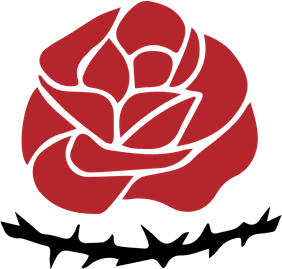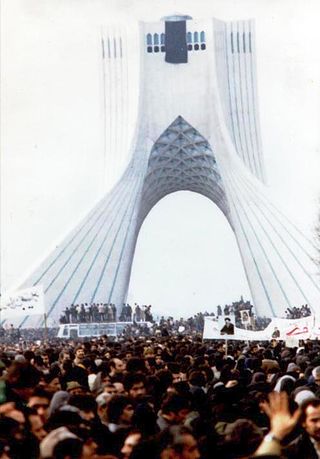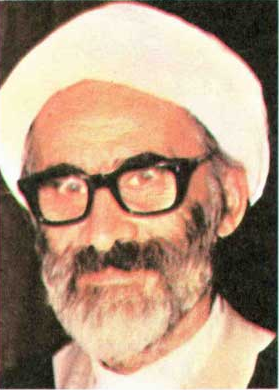
Sayyed Abol-Ghasem Mostafavi-Kashani was an Iranian politician and Shia Marja. He played an important role in the 1953 coup in Iran and the overthrow of Prime Minister Mohammad Mosaddegh.

The Tudeh Party of Iran is an Iranian communist party. Formed in 1941, with Soleiman Mirza Eskandari as its head, it had considerable influence in its early years and played an important role during Mohammad Mosaddegh's campaign to nationalize the Anglo-Persian Oil Company and his term as prime minister. Tudeh became a pro-Soviet organization after the Iran crisis of 1946 and was prepared to carry out the dictates of the Kremlin, even if it meant sacrificing Iranian political independence and sovereignty. The crackdown that followed the 1953 coup against Mosaddegh is said to have "destroyed" the party, although a remnant persisted. The party still exists but has remained much weaker as a result of its banning in Iran and mass arrests by the Islamic Republic in 1982, as well as the executions of political prisoners in 1988. Tudeh identified itself as the historical offshoot of the Communist Party of Persia.

The Islamic Republican Party was formed in 1979 to assist the Iranian Revolution and Ayatollah Khomeini in their goal to establish theocracy in Iran. It was disbanded in 1987 due to internal conflicts.
Majid Sharif-Vaghefi was a leading member of the People's Mujahedin of Iran (MEK) who was murdered in an internal purge staged by the MEK Marxist faction. One of the three members of the MEK's central committee from 1972 to 1975, he was considered the leader of the group's Muslim faction that refused to accept Marxism.

Traditionally, the thought and practice of Islamic fundamentalism and Islamism in the nation of Iran has referred to various forms of Shi'i Islamic religious revivalism that seek a return to the original texts and the inspiration of the original believers of Islam. Issues of importance to the movement include the elimination of foreign, non-Islamic ideas and practices from Iran's society, economy and political system. It is often contrasted with other strains of Islamic thought, such as traditionalism, quietism and modernism. In Iran, Islamic fundamentalism and Islamism is primarily associated with the thought and practice of the leader of the Islamic Revolution and founder of the Islamic Republic of Iran, Ayatollah Ruhollah Khomeini ("Khomeinism"), but may also involve figures such as Fazlullah Nouri, Navvab Safavi, and successors of Khomeini.

Khomeinism refers to the religious and political ideas of the leader of the 1979 Iranian Islamic Revolution, Ruhollah Khomeini. Khomeinism may also refer to the ideology of the clerical class which has ruled Islamic Republic of Iran founded by Khomeini, following his death. It can also be used to refer to the "radicalization" of segments of the Twelver Shia populations of Iran, Iraq, and Lebanon, and the Iranian government's "recruitment" of Shia minorities in Afghanistan, Pakistan, Saudi Arabia and Africa. The word Khomeinist and Khomeinists, derived from Khomeinism, can also be used to describe members of Iran's clerical rulers and attempt to differentiate them from "regular" Shia Muslim clerics.

The Organization of Struggle for the Emancipation of the Working Class, or simply Peykar, also known by the earlier name Marxist Mojahedin, was a splinter group from the People's Mojahedin of Iran (PMOI/MEK).

Several left-wing guerrilla groups attempting to overthrow the pro-Western regime of Shah Mohammad Reza Pahlavi were notable and active in Iran from 1971 to 1979. The groups shared a commitment to armed struggle, but differed in ideology. Most were Marxist in orientation. The largest group — People's Mujahedin of Iran — was founded as a left wing movement with the aim to overthrow Iran's cleric rule.
The ideology of the Iranian Revolution has been called a "complex combination" of Pan-Islamism, political populism, and Shia Islamic "religious radicalism"; "a struggle against paganism, oppression, and empire. Perhaps the most important of the diverse ideological interpretation of Islam within the grand alliance that led to the 1979 revolution were Khomeinism, Ali Shariati’s Islamic-left ideology, Mehdi Bazargan’s liberal-democratic Islam. Less powerful were the socialist guerrilla groups of Islamic and secular variants, and the secular constitutionalism in socialist and nationalist forms. Contributors to the ideology also included Jalal Al-e-Ahmad, who formulated the idea of Gharbzadegi—that Western culture must be rejected and fought as was a plague or an intoxication that alienated Muslims from their roots and identity.
A constitutional referendum was held in Iran on 2 and 3 December 1979. The new Islamic constitution was approved by 99.5% of voters.

Constitutional Convention elections were held in Iran on 3 and 4 August 1979. The result was a victory for the Islamic Republican Party. There were 10,784,932 votes cast in the elections, marking 51.71% turnout. Of all members elected, 68% were clerics.

Socialism in Iran or Iranian socialism is a political ideology that traces its beginnings to the 20th century and encompasses various political parties in the country. Iran experienced a short Third World Socialism period at the zenith of the Tudeh Party after the abdication of Reza Shah and his replacement by his son, Mohammad Reza Pahlavi. After failing to reach power, this form of third world socialism was replaced by Mosaddegh's populist, non-aligned Iranian nationalism of the National Front party as the main anti-monarchy force in Iran, reaching power (1949–1953), and it remained with that strength even in opposition until the rise of Islamism and the Iranian Revolution. The Tudehs have moved towards basic socialist communism since then.

Ali Golzadeh Ghafouri was an Iranian Shia cleric and religious progressive politician.

Taher Ahmadzadeh Heravi was an Iranian nationalist-religious political activist who held office as the first governor of Khorasan Province after the Iranian Revolution.

Mousa Nasiroghli (Khiabani) (Persian: موسی نصیر اوغلی (خیابانی); 1947 – 8 February 1982) was an Iranian dissident political leader and senior member of the People's Mojahedin of Iran (MEK) and the commander of its armed wing from 1979 to 1982, when he was killed in action.

Abdolsamad Kambakhsh son of Prince Kamran Mirza Adle Qajar, also known by his aliases as Abdolsamad Qanbari or the Red Prince, was an Iranian communist political activist. In early 1925, he married feminist activist Dr. Akhtar Kianouri. Noureddin Kianouri, the younger brother of Dr. Akhtar Kianouri, grew up in their house.

Seyyed Ahmad Razavi was an Iranian engineer and politician.

Radical Islam: The Iranian Mojahedin is a book by historian Ervand Abrahamian about the late 20th-century political history of Iran, and a thorough case study of the People's Mujahedin of Iran (MEK). The book also includes a short biography of Ali Shariati and a review of his works in order to explore the influence this had on the group's early ideological traits. The book was a duplicate publication by I.B. Tauris and by Yale University Press, being first published by the former in 1989 in the United Kingdom. It is widely regarded as an important academic source on the MEK.
Shia Islamism is the usage of Shia Islam in politics. Most study and reporting on Islamism has been focused on Sunni Islamist movements. Shia Islamism, a previously very small ideology, was boosted after the Iranian Revolution led by Ruhollah Khomeini, whose Shia Islamist policies became known as Khomeinism.

Iran Between Two Revolutions is a book by Ervand Abrahamian that was published in 1982 by Princeton University Press in New Jersey, United States. This book has been translated into Persian and published many times in Iran. The book has eleven chapters.















